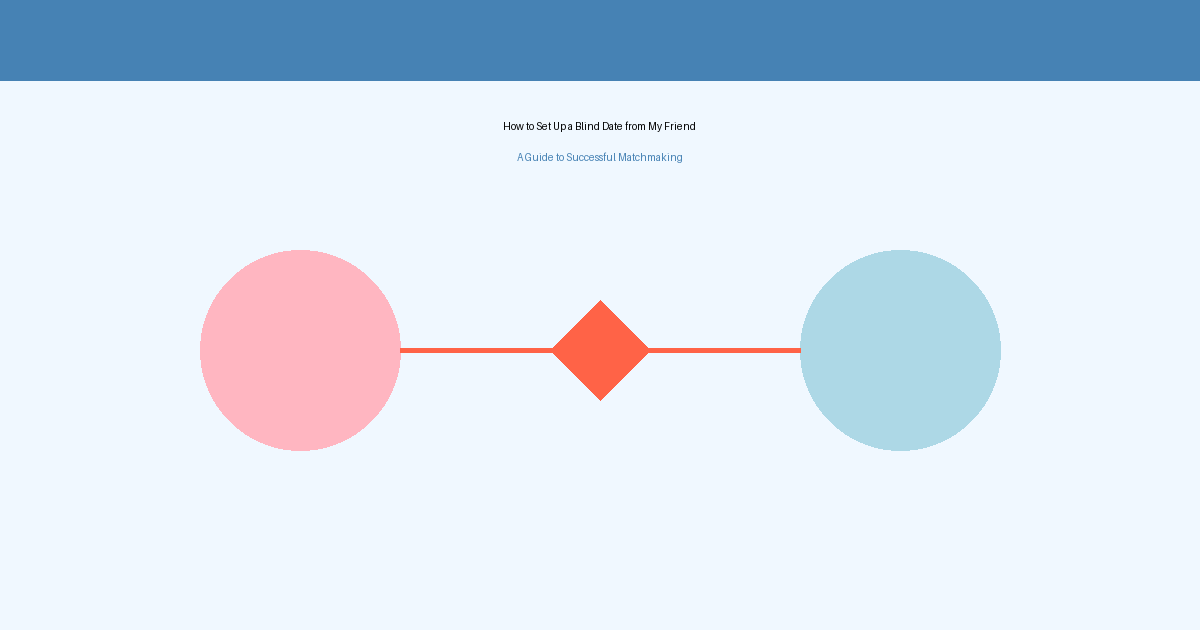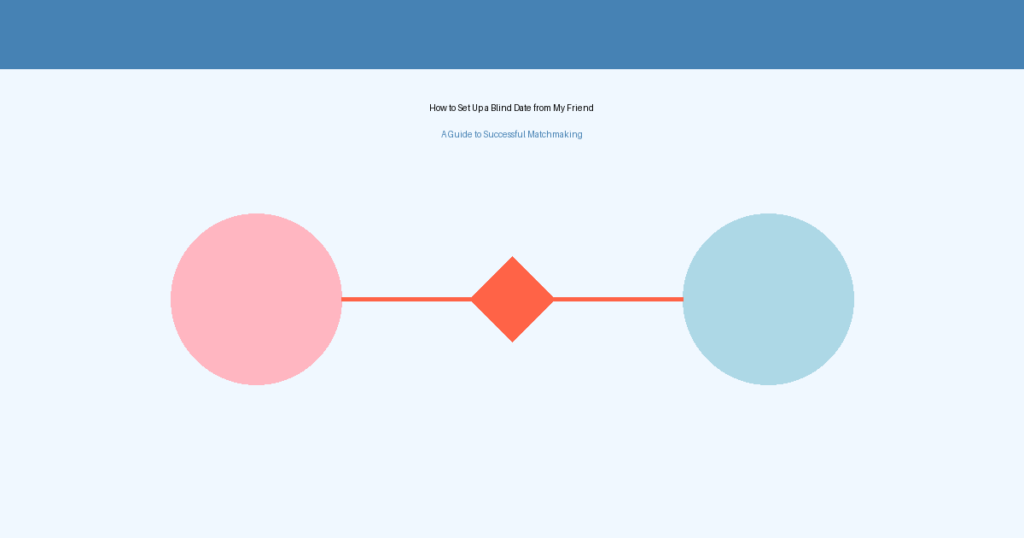
Have you ever looked at two of your single friends and thought, “These two would be perfect together”? That matchmaking instinct is more common than you might think. There’s something uniquely satisfying about bringing two compatible people together and watching a potential relationship bloom. While dating apps continue to dominate the modern dating landscape, there’s a special charm and personal touch to setting up friends on blind dates that technology simply cannot replicate.
Playing matchmaker for your friends can be both exciting and nerve-wracking. You’re essentially putting your social intuition on the line, and the outcome could affect multiple friendships. But when done thoughtfully, providing blind date tips and facilitating meaningful connections can be incredibly rewarding. Whether you’re a seasoned matchmaker or considering your first attempt at pairing friends, this guide will walk you through the delicate art of setting up friends on blind dates that have genuine potential for success.
In the following sections, we’ll explore everything from identifying truly compatible friends to planning the perfect blind date scenario. We’ll draw on expert advice and real-world experiences to help you navigate this social endeavor with confidence and sensitivity. By the end, you’ll have all the tools you need to play Cupid without overstepping boundaries or creating awkward situations
Why Play Matchmaker
The desire to connect people we care about runs deep in human nature. There’s something inherently satisfying about recognizing compatibility between two individuals and facilitating a connection that might never have happened otherwise. In an age dominated by algorithms and dating apps, the personal touch of a friend’s recommendation carries special weight. According to recent statistics, approximately 43% of Americans have gone on a blind date at some point, demonstrating that despite technological advances in dating, traditional setups remain relevant.
What makes friend-based matchmaking different from dating apps is the human element. While apps match people based on self-reported interests and carefully curated photos, you have insider knowledge about your friends’ authentic personalities, values, and relationship patterns. You’ve seen them at their best and worst, giving you insights that no algorithm could capture. This is why many professional matchmaking services attempt to replicate this friend-based approach, charging premium fees to provide what you can offer naturally: personalized introductions based on genuine compatibility.
The benefits of arranging blind dates extend beyond just potential romance. Even when a romantic connection doesn’t spark, you’ve potentially helped two people expand their social circles. Many successful friendships have emerged from blind dates that didn’t lead to romance. Additionally, you’re providing your friends with an opportunity to meet someone pre-vetted by someone they trust—you—which can reduce the anxiety and uncertainty that often accompanies meeting complete strangers.
However, playing matchmaker comes with responsibility. Unlike professional matchmaking services that maintain emotional distance, your relationships with both parties are personal and ongoing. This means the stakes are higher, but so are the potential rewards. When a match you’ve made blossoms into something meaningful, there’s a special satisfaction in knowing you’ve positively impacted your friends’ lives in a significant way.
Identifying Compatible Friends
The foundation of successful matchmaking lies in your ability to recognize genuine compatibility beyond surface-level similarities. While it might be tempting to pair friends simply because they’re both single or share a common interest, lasting connections require deeper alignment. Effective dating advice suggests looking beyond obvious traits like both friends enjoying hiking or being fans of the same TV show.
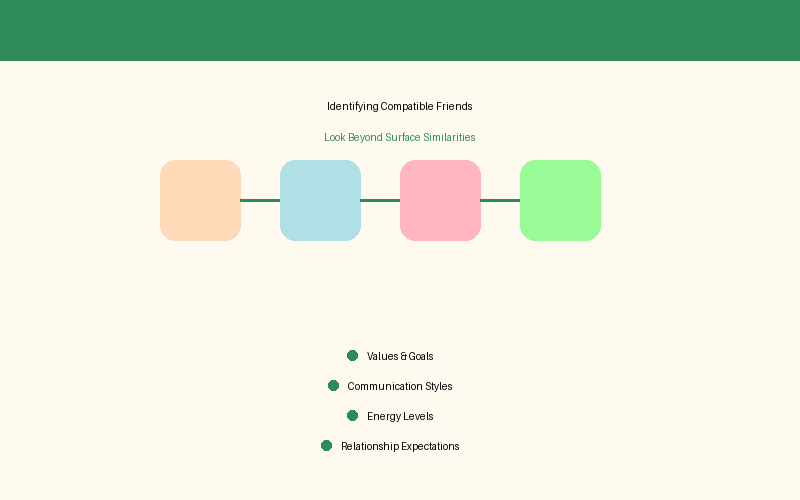
Instead, consider core values, communication styles, and life goals. Does one friend value deep philosophical conversations while the other prefers light-hearted banter? Is one focused on career advancement while the other prioritizes work-life balance? These fundamental aspects of personality often determine relationship success more than shared hobbies. Think about past relationships your friends have had—what worked, what didn’t, and what patterns emerge? This insight can be invaluable when considering potential matches.
A common mistake in amateur matchmaking is focusing too heavily on demographic similarities. Just because two friends are the same age, from similar backgrounds, or work in related fields doesn’t necessarily mean they’ll connect romantically. Professional matchmaking services understand this distinction and focus on compatibility factors that actually matter: emotional intelligence, conflict resolution styles, attachment patterns, and values alignment.
Before proceeding with any setup, ask yourself these critical questions:
- Do these friends have compatible communication styles?
- Do they share similar values regarding important life decisions?
- Are their energy levels and social preferences complementary?
- Do they have similar expectations about relationships?
- Would they genuinely enjoy each other’s company regardless of romantic potential?
Remember that your goal isn’t just to create a date but to potentially initiate a meaningful connection. The best dating advice emphasizes quality over quantity. It’s better to arrange one thoughtful match with genuine potential than multiple superficial setups that fizzle quickly. Take time to reflect on what makes each of your friends unique and what kind of partner would truly complement their personality and life vision.
The Perfect Approach – Asking Both Parties
Once you’ve identified two friends who might be compatible, the next crucial step is approaching them about the potential setup. This is where many amateur matchmakers falter, either by being too pushy or by creating awkward situations. Setting up friends requires tact, sensitivity, and respect for boundaries.
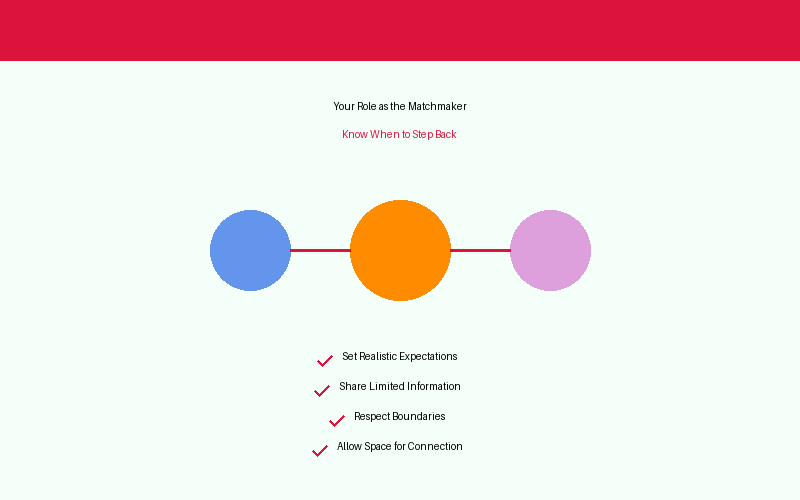
The golden rule of matchmaking is transparency. Begin by approaching each friend individually in a private setting. A casual, low-pressure conversation works best. You might start with something like, “I know someone I think you might really hit it off with. Would you be open to me setting up an introduction?” This phrasing is non-committal and gives your friend space to decline without feeling pressured.
When describing the potential match, be honest but strategic. Highlight genuine points of compatibility and shared interests, but avoid overselling or making promises about chemistry. Professional matchmaking services train their staff to set realistic expectations while emphasizing positive attributes. You might say, “You both have similar values around family and share that dry sense of humor I love. I think you’d enjoy each other’s company.”
If one or both friends express hesitation, respect their decision without taking it personally. Remember that timing plays a significant role in dating readiness. Your friend might be focusing on career goals, recovering from a breakup, or simply not in the headspace for dating. A response like, “No problem at all. If you change your mind later, just let me know,” maintains the friendship while leaving the door open for future possibilities.
If both parties agree to the setup, be clear about how much information you’ll share beforehand. Some people prefer knowing very little to preserve the “blind” element of the blind date, while others appreciate having some background to ease anxiety. Ask each friend what they’re comfortable with and honor those preferences.
Planning the Perfect Blind Date
The venue and activity you choose for a blind date can significantly impact its success. Creating the right environment is essential for fostering connection while minimizing awkwardness. When planning a successful blind date, consider both the personalities involved and the type of interaction you want to encourage.
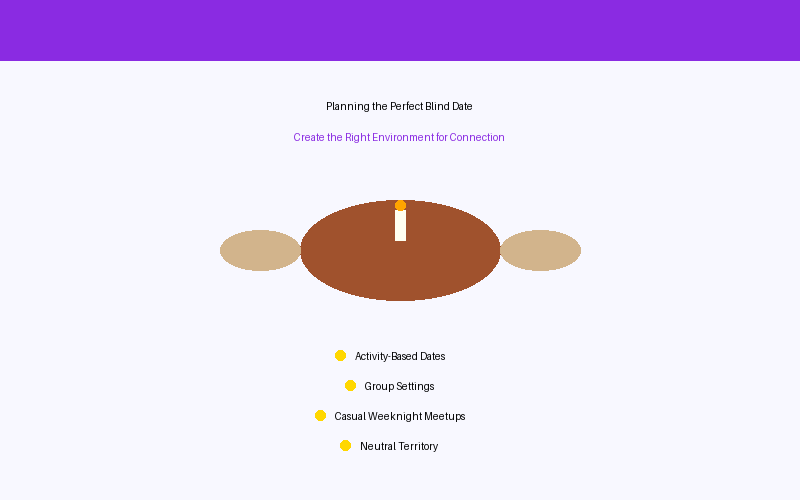
Activity-based dates often outperform traditional dinner setups, especially for first meetings. While restaurants are the conventional choice, they can sometimes feel like interviews, with participants sitting across from each other answering questions. Instead, consider activities that provide natural conversation starters and shared experiences. Cooking classes, art galleries, casual hikes, or even arcade games create opportunities for interaction without the pressure of constant conversation.
For friends who might be particularly nervous about a blind date, group settings can be ideal. Organizing a small gathering where your two friends can meet organically reduces pressure and expectations. This approach works especially well for more introverted individuals who might find one-on-one blind dates intimidating. You might invite both to a dinner party, game night, or casual happy hour with a few other friends. This allows them to interact naturally while having the social buffer of other people.
Timing considerations are also crucial for a successful blind date. Weeknight dates often work better than weekend evenings, which can carry higher expectations. A coffee or drink after work provides a natural time limit—if things aren’t clicking, participants can easily excuse themselves; if the connection is promising, they can extend the date to dinner. Daytime dates on weekends also work well, as they tend to feel more casual and less romantically pressured than evening meetings.
Location logistics matter more than you might think. Choose a venue that’s convenient for both parties, ideally somewhere neither person has strong associations with past relationships. Neutral territory helps both participants feel comfortable. Also consider noise levels—too quiet can amplify awkward silences, while too loud can frustrate attempts at conversation. The sweet spot is a moderately busy place with ambient background noise but where conversation is still easy.
Your Role as the Matchmaker
Once you’ve set the date in motion, defining your role as matchmaker becomes crucial. The line between helpful facilitator and intrusive meddler can be thin, and knowing where to stand makes all the difference. Professional matchmaking services have strict protocols about involvement levels, and you can learn from their approach.
Setting appropriate expectations is your first responsibility. Be honest with both parties about what they might experience. Avoid overselling the potential match with comments like “You’re going to fall in love!” or “I’ve found your perfect person!” Instead, frame the setup as an opportunity to meet someone interesting with whom they share some compatibility. A more measured approach might be, “I think you’ll enjoy each other’s company, and I’m curious to see if you connect.”
How much information should you share beforehand? This delicate balance varies by situation. Generally, providing basic information (profession, some shared interests, and perhaps a brief personality description) gives enough context without creating preconceived judgments. Avoid sharing extensive dating histories, personal struggles, or intimate details that your friends might prefer to reveal themselves. Remember that part of the excitement of a blind date is discovery.
The most important boundary to establish is when to step back. Once introductions are made and the date is arranged, resist the urge to micromanage. Don’t text during the date asking for updates, don’t “accidentally” show up at the venue, and definitely don’t sit at a nearby table to observe. These behaviors, while tempting, undermine the authentic connection you’re trying to foster.
Matchmaking services professionals emphasize that the matchmaker’s job ends when the date begins. Your friends need space to develop their own dynamic without feeling observed or evaluated. This hands-off approach also protects you if things don’t go well. By maintaining appropriate distance, you avoid becoming entangled in potential disappointments or mismatched expectations.
Following Up After the Date
The aftermath of a blind date you’ve arranged requires as much finesse as the setup itself. How and when you follow up can significantly impact both the potential relationship and your friendships. Timing is everything—wait at least a day before checking in, giving both parties space to process their impressions and feelings.
When you do reach out, keep your approach casual and open-ended. A simple message like, “Hope you had a good time yesterday. No pressure to share details, but I’m here if you want to talk about it,” respects their privacy while showing interest. This approach acknowledges that dating experiences are personal, and your friends may not want to share everything, especially if the date didn’t go well.
Different outcomes require different responses from you as the matchmaker. If both friends report positive experiences, celebrate quietly without overreacting. Excessive enthusiasm might create pressure that could stifle a naturally developing connection. If one person felt a spark while the other didn’t, offer empathetic dating advice without betraying confidences. You might say, “Dating chemistry is unpredictable, and it doesn’t reflect on either of you personally.”
If the date was unsuccessful for both parties, resist the urge to immediately suggest another match. Instead, listen to their feedback and acknowledge that not every setup works out. The most valuable dating advice recognizes that each experience provides insights for future connections. Perhaps your friends learned something about their preferences or communication styles that will help them in their dating journey.
Sometimes, a blind date that doesn’t lead to romance can still result in a meaningful friendship. Encourage this possibility if both parties enjoyed each other’s company but didn’t feel romantic chemistry. Many lasting friendships have emerged from initial romantic setups, expanding both individuals’ social circles in valuable ways.
Conclusion
The art of setting up friends on blind dates combines intuition, sensitivity, and thoughtful planning. When done well, it can lead to meaningful connections that might never have happened otherwise. Throughout this guide, we’ve explored essential blind date tips that can help you navigate this delicate social endeavor with confidence and respect for all involved.
Remember that successful matchmaking begins with genuine compatibility assessment, not just pairing two single friends for the sake of it. Take time to consider the deeper aspects of personality and values that create lasting connections. When approaching friends about a potential setup, transparency and respect for boundaries are paramount. No one should ever feel pressured into a blind date, no matter how perfect you believe the match might be.
The planning phase offers opportunities to create environments conducive to authentic connection. Whether you choose activity-based outings, group settings, or traditional one-on-one meetings, the goal is to facilitate comfortable interaction where your friends can discover each other naturally. Professional matchmaking services succeed because they understand that the right environment can make all the difference in how people connect.
Perhaps most importantly, know when to step back. Your role in setting up friends has natural limitations, and respecting these boundaries protects both your friendships

